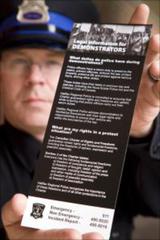
2010-06-25
Keith Leslie
TORONTO – Extra police powers to arrest people during the G20 summit, secretly granted earlier this month, had critics likening Ontario to a “tin-pot dictatorship” Friday.
A regulation allowing police to stop and search anyone coming within five metres of the summit site’s security fence — and arrest them if they fail to show identification — was passed June 2 by a committee of cabinet.
Still, the new rules only came to light after a 31-year-old man was arrested Thursday and detained for five hours.
The law, which includes penalties of up to two months in jail and a $500 fine, went into effect on Monday. It expires next Monday, after the G20 wraps up in Toronto.

The update to the decades-old Ontario Public Works Protection Act, which allows police to search people entering public buildings such as a court house, was passed the same as most regulations, said Community Safety Minister Rick Bartolucci.
“There was nothing secret,” insisted Bartolucci. “The process that normally happens with regulations was followed.”
Bartolucci said it was up to Toronto police to explain why they didn’t make the provisions of the new regulation public.
However, the opposition parties were fuming at the government’s move to give police more powers without holding a debate, even though the legislature was sitting when the law was changed.
And people strolling by the fence Friday were shocked.
“I think it’s really a violation of our human rights,” said government worker Lana Carillo, 31, who angrily predicted people will be “up in arms about it.”
Louise Kelly, 72, said most people are just curious about the fence and the G20 security area and should have been warned not to go within five metres of it.
“I’m very surprised that we weren’t informed about it beforehand,” said Kelly.
“It’s not right just to act without letting us know. It is against our rights.”
The Canadian Civil Liberties Association called the regulation dangerous. Giving police the extra powers for the G20 summit was an “inappropriate use” of the law to protect public buildings, it said.
“This was done in secret,” said spokeswoman Nathalie Des Rosiers. “It was not done in a way that could be challenged in court.”
Toronto police Chief Bill Blair, who requested the change to label a large section of downtown Toronto as a public work under the law, said police were not given sweeping new powers.
“We do not want to be in a situation, and we’re not seeking, extraordinary powers to arrest our citizens,” said Blair.
“We are only seeking a clear authority to enable us to maintain a secure perimeter.”
Premier Dalton McGuinty passed the law in secret and then kept it secret, creating a situation in which people don’t know if they’re breaking the law, said NDP justice critic Peter Kormos.
“Secret laws that result in people’s arrest and detention, like this one, are the hallmarks of tin-pot dictatorships,” he said.
The Progressive Conservatives accused McGuinty of ignoring the legislature to meet a special request from police.
“This was worth a debate,” said Opposition critic Garfield Dunlop.
“It’s not a dictatorship here, people have a right to have an opinion on this.”
John Segsworth, 59, called it “disgraceful” as he briskly walked near the security fence.
But others, such as Mark Beharry, 35, said the new rule is just part of overall G20 security, although he said advance notice would have been appreciated.
“I guess if you’re here you should probably know that the security forces are out and that’s probably something you can expect,” said Beharry. “But I’m glad it’s only until Monday.”
A Facebook group created after the law became public compared it to Canada’s War Measures Act and said it “seriously curtails our rights and freedoms.”
People also took to Twitter to talk about the regulations, calling it “unbelievable.”
— With files from Ciara Byrne